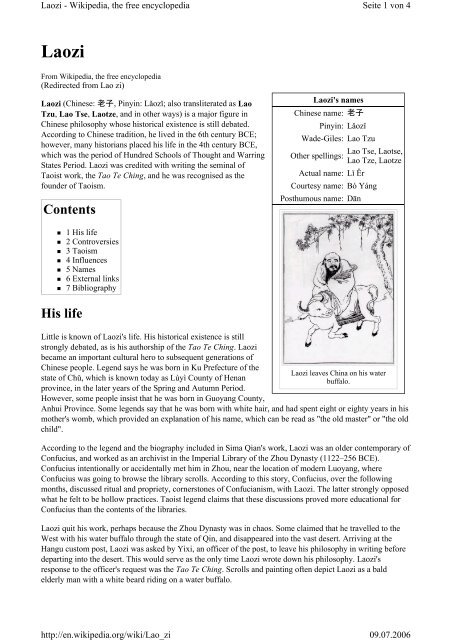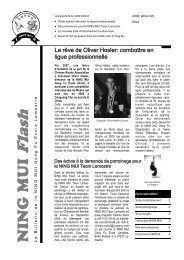Laozi
Laozi
Laozi
You also want an ePaper? Increase the reach of your titles
YUMPU automatically turns print PDFs into web optimized ePapers that Google loves.
<strong>Laozi</strong> - Wikipedia, the free encyclopedia<br />
<strong>Laozi</strong><br />
From Wikipedia, the free encyclopedia<br />
(Redirected from Lao zi)<br />
<strong>Laozi</strong> (Chinese: 老子, Pinyin: Lǎozǐ; also transliterated as Lao<br />
Tzu, Lao Tse, Laotze, and in other ways) is a major figure in<br />
Chinese philosophy whose historical existence is still debated.<br />
According to Chinese tradition, he lived in the 6th century BCE;<br />
however, many historians placed his life in the 4th century BCE,<br />
which was the period of Hundred Schools of Thought and Warring<br />
States Period. <strong>Laozi</strong> was credited with writing the seminal of<br />
Taoist work, the Tao Te Ching, and he was recognised as the<br />
founder of Taoism.<br />
Contents<br />
1 His life<br />
2 Controversies<br />
3 Taoism<br />
4 Influences<br />
5 Names<br />
6 External links<br />
7 Bibliography<br />
His life<br />
Little is known of <strong>Laozi</strong>'s life. His historical existence is still<br />
strongly debated, as is his authorship of the Tao Te Ching. <strong>Laozi</strong><br />
became an important cultural hero to subsequent generations of<br />
Chinese people. Legend says he was born in Ku Prefecture of the<br />
state of Chǔ, which is known today as Lùyì County of Henan<br />
province, in the later years of the Spring and Autumn Period.<br />
However, some people insist that he was born in Guoyang County,<br />
<strong>Laozi</strong>'s names<br />
Chinese name: 老子<br />
Pinyin: Lǎozǐ<br />
Wade-Giles: Lao Tzu<br />
Lao Tse, Laotse,<br />
Other spellings:<br />
Lao Tze, Laotze<br />
Actual name: Lǐ Ěr<br />
Courtesy name: Bó Yáng<br />
Posthumous name: Dān<br />
<strong>Laozi</strong> leaves China on his water<br />
buffalo.<br />
Seite 1 von 4<br />
Anhui Province. Some legends say that he was born with white hair, and had spent eight or eighty years in his<br />
mother's womb, which provided an explanation of his name, which can be read as "the old master" or "the old<br />
child".<br />
According to the legend and the biography included in Sima Qian's work, <strong>Laozi</strong> was an older contemporary of<br />
Confucius, and worked as an archivist in the Imperial Library of the Zhou Dynasty (1122–256 BCE).<br />
Confucius intentionally or accidentally met him in Zhou, near the location of modern Luoyang, where<br />
Confucius was going to browse the library scrolls. According to this story, Confucius, over the following<br />
months, discussed ritual and propriety, cornerstones of Confucianism, with <strong>Laozi</strong>. The latter strongly opposed<br />
what he felt to be hollow practices. Taoist legend claims that these discussions proved more educational for<br />
Confucius than the contents of the libraries.<br />
<strong>Laozi</strong> quit his work, perhaps because the Zhou Dynasty was in chaos. Some claimed that he travelled to the<br />
West with his water buffalo through the state of Qin, and disappeared into the vast desert. Arriving at the<br />
Hangu custom post, <strong>Laozi</strong> was asked by Yixi, an officer of the post, to leave his philosophy in writing before<br />
departing into the desert. This would serve as the only time <strong>Laozi</strong> wrote down his philosophy. <strong>Laozi</strong>'s<br />
response to the officer's request was the Tao Te Ching. Scrolls and painting often depict <strong>Laozi</strong> as a bald<br />
elderly man with a white beard riding on a water buffalo.<br />
http://en.wikipedia.org/wiki/Lao_zi<br />
09.07.2006
<strong>Laozi</strong> - Wikipedia, the free encyclopedia<br />
Controversies<br />
Some controversial theories about <strong>Laozi</strong> are:<br />
The discussion with Confucius might have been fabricated by Taoists to make their school of<br />
philosophy sound superior to Confucianism.<br />
The actual author(s) of the Tao Te Ching might have created a fictitious character so that the origin of<br />
the text would look more mysterious, thus making it easier to be popularised.<br />
Arguments that "<strong>Laozi</strong>" was a pseudonym of Dan, Prefect of the Grand Scribes, or of an old man from<br />
Lai, a prefecture in the state of Qí, or of some other historical persons.<br />
It is also believed that the Tao Te Ching was written as a guideline for emperors as how to rule their<br />
empire in a more natural way; "Ruling by not ruling". This can be found in the numerous references in<br />
the Tao Te Ching which stated: "Not exalting man of worth, prevents people from competing" and<br />
"Not putting high value on rare goods, prevents people from being bandit" and "Human hunger is the<br />
result of overtaxation. For this reason, there is hunger".<br />
Taoism<br />
<strong>Laozi</strong>'s work, the Tao Te Ching, is one of the most significant<br />
treatises in Chinese philosophy. It is his magnum opus,<br />
covering large areas of philosophy from individual<br />
spirituality and inter-personal dynamics to political<br />
techniques.<br />
<strong>Laozi</strong> developed the concept of "Tao", often translated as "the<br />
Way", and widened its meaning to an inherent order or<br />
property of the universe: "The way Nature is". He highlighted<br />
the concept of Wei wuwei, or "action without action". This<br />
does not mean that one should hang around and do nothing,<br />
but that one should avoid explicit intentions, strong wills or<br />
proactive actions;<br />
<strong>Laozi</strong> believed that violence should be avoided as much as<br />
possible, and that military victory -- which logically would be<br />
attained through use of force -- should be an occasion for<br />
mourning rather than triumphant celebration.<br />
Similarly to the arguments fowarded by Plato in the Republic<br />
on various form of governing, <strong>Laozi</strong> said that the codification<br />
of laws and rules into the society created difficulty and<br />
complexity in managing and governing.<br />
Seite 2 von 4<br />
<strong>Laozi</strong>, from Myths and Legends of China<br />
(1922) by E.T.C. Werner<br />
As with most other ancient Chinese philosophers, <strong>Laozi</strong> often explains his ideas by way of paradox, analogy,<br />
appropriation of ancient sayings, repitition, symmetry, rhyme, and rhythm. The writings attributed to him are<br />
often very dense and poetic. They serve as a starting point for cosmological or introspective meditations.<br />
Many of the aesthetic theories of Chinese art are widely grounded in his ideas and those of his most famous<br />
follower Zhuang Zi.<br />
Some people suggest that the closest parallel to Taoist philosophy in the west is the Traditionalist School,<br />
specifically the works of Ananda Coomaraswamy and Rene Guenon.<br />
http://en.wikipedia.org/wiki/Lao_zi<br />
09.07.2006
<strong>Laozi</strong> - Wikipedia, the free encyclopedia<br />
The libertarian economist Murray N. Rothbard suggests that <strong>Laozi</strong> was the first libertarian, likening <strong>Laozi</strong>'s<br />
ideas on government to F.A. Hayek's theory of spontaneous order. [1] (http://www.mises.org/story/1967) (See<br />
also: [2] (http://www.mises.org/journals/jls/9_2/9_2_3.pdf).) Similarly, the Cato Institute's David Boaz<br />
includes passages from the Tao Te Ching in his 1997 book The Libertarian Reader [3]<br />
(http://www.libertarianism.org/reader.html)<br />
Influences<br />
<strong>Laozi</strong>'s most famous follower, Zhuang Zi, wrote a book that had a great deal of influence on Chinese Literati,<br />
through the ideas of individualism, freedom, carefreeness, and, even if the author never speaks about it, art,<br />
which may well be the cornerstone of Chinese aesthetic.<br />
Names<br />
The name "<strong>Laozi</strong>" is an honorific. Lao means "venerable" or "old". Zi or tsu translates literally as "boy", but it<br />
was also a term for a rank of nobleman equivalent to viscount, as well as a term of respect attached to the<br />
names of revered masters; thus, "<strong>Laozi</strong>" can be translated roughly as "the old master".<br />
<strong>Laozi</strong>'s personal name may have been Li Er, his courtesy name may have been Boyang, and also Dan, which<br />
also means "mysterious".<br />
<strong>Laozi</strong> is also known as:<br />
Laodan<br />
Great Lord<br />
Li the Great Lord<br />
Lao the Great Lord<br />
<strong>Laozi</strong> the Lord of Tao<br />
In the Li Tang Dynasty, in order to create a connection to <strong>Laozi</strong> as the ancestor of the imperial family, he was<br />
honoured as The Emperor of Xuanyuan , meaning "Profoundly Elementary;" with a temple name of Shengzu,<br />
meaning "Saintly/Sagely Progenitor".<br />
External links<br />
A reconstructed portrait of <strong>Laozi</strong><br />
(http://www.reportret.info/gallery/laozi1.html), based<br />
on historical sources, in a contemporary style.<br />
Lao Tzu Page (http://www.taopage.org/laotzu) that<br />
provides teachings on <strong>Laozi</strong>, his life and philosophical<br />
concepts.<br />
A collection of resources on <strong>Laozi</strong> by Patrick<br />
Jennings: Critical Thinkers: Lao Tse & Daoism<br />
(http://www.synaptic.bc.ca/ejournal/laotse.htm).<br />
Stanford Encyclopedia of Philosophy entry<br />
(http://plato.stanford.edu/entries/laozi/)<br />
"The Philosophers: Lao-<br />
Wikiquote has a collection of<br />
quotations related to:<br />
<strong>Laozi</strong><br />
Wikisource has original works<br />
written by or about:<br />
<strong>Laozi</strong><br />
Seite 3 von 4<br />
Wikimedia Commons has media<br />
related to:<br />
<strong>Laozi</strong><br />
Tzu" (http://www.humanistictexts.org/po_chu_i.htm#_Toc483883516) - a poem that criticized <strong>Laozi</strong><br />
by Po Chu-I, translated by Arthur Waley<br />
Works by Lao Zi (http://www.gutenberg.org/author/<strong>Laozi</strong>) at Project Gutenberg<br />
http://en.wikipedia.org/wiki/Lao_zi<br />
09.07.2006
<strong>Laozi</strong> - Wikipedia, the free encyclopedia<br />
Bibliography<br />
Seite 4 von 4<br />
Lau, D. C. Lao Tzu: Tao Te Ching. London: Penguin Classics, 1963. ISBN 0-140-44131-X<br />
Wing-tsit Chan, "The Natural Way of Lao Tzu". Chapter 6, A Source Book in Chinese Philosophy.<br />
Princeton: Princeton University Press, 1963. ISBN 0-691-01964-9<br />
Henricks, Robert (translator). Lao-Tzu, Te-Tao Ching: A New Translation Based on the Recently<br />
Discovered Ma-wang-tui Texts. New York: Ballantine Books, 1989. ISBN 0-345-37099-6<br />
Waley, Arthur (translator). The Way and Its Power: A Study of the Tao Te Ching and Its Place in<br />
Chinese Thought. New York: Grove Press, 1958. ISBN 0-394-17207-8<br />
Welch, Holmes. Taoism: the Parting of the Way. Boston: Beacon Press, 1965. ISBN 0-8070-5973-0<br />
Retrieved from "http://en.wikipedia.org/wiki/<strong>Laozi</strong>" This page contains Chinese text.<br />
Without proper rendering support, you<br />
Categories: Wikipedia articles needing copy edit |<br />
may see question marks, boxes, or other<br />
Articles lacking sources | Articles containing Chinese<br />
symbols instead of Chinese characters.<br />
text | Chinese philosophers | Chinese thinkers | Year of<br />
birth unknown | Year of death unknown | Mysterious people | Taoism | Taoists<br />
http://en.wikipedia.org/wiki/Lao_zi<br />
This page was last modified 03:15, 9 July 2006.<br />
All text is available under the terms of the GNU Free<br />
Documentation License. (See Copyrights for details.)<br />
Wikipedia® is a registered trademark of the Wikimedia<br />
Foundation, Inc.<br />
09.07.2006



